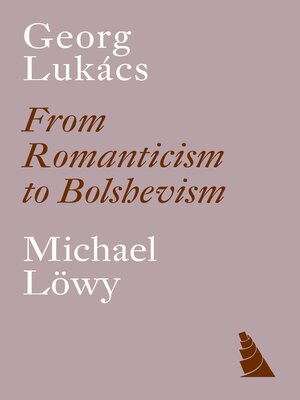
Sign up to save your library
With an OverDrive account, you can save your favorite libraries for at-a-glance information about availability. Find out more about OverDrive accounts.
Find this title in Libby, the library reading app by OverDrive.



Search for a digital library with this title
Title found at these libraries:
| Library Name | Distance |
|---|---|
| Loading... |
The philosophical and political development that converted Georg Luk�cs from a distinguished representative of Central European aesthetic vitalism into a major Marxist theorist and Communist militant has long remained an enigma. In this this now classic study, Michael L�wy for the first time traced and explained the extraordinary mutation that occurred in Luk�cs's thought between 1909 and 1929. Utilizing many as yet unpublished sources, L�wy meticulously reconstructed the complex itinerary of Luk�cs's thinking as he gradually moved towards his decisive encounter with Bolshevism. The religious convictions of the early Luk�cs, the peculiar spell exercised on him and on Max Weber by Dostoyevskyan images of pre-revolutionary Russia, the nature of his friendships with Ernst Bloch and Thomas Mann, were amongst the discoveries of the book. Then, in a fascinating case-study in the sociology of ideas, L�wy showed how the same philosophical problematic of Lebensphilosophie dominated the intelligentsias of both Germany and Hungary in the pre-war period, yet how the different configurations of social forces in each country bent its political destiny into opposite directions. The famous works produced by Luk�cs during and after the Hungarian Commune-Tactics and Ethics, History and Class Consciousness and Lenin-were analysed and assessed. A concluding chapter discussed Luk�cs's eventual ambiguous settlement with Stalinism in the thirties, and its coda of renewed radicalism in the final years of his life.
In this new edition, L�wy has added a substantial new introduction which reassess the nature of Luk�cs's thought in the light of newly published texts and debates.
In this new edition, L�wy has added a substantial new introduction which reassess the nature of Luk�cs's thought in the light of newly published texts and debates.







